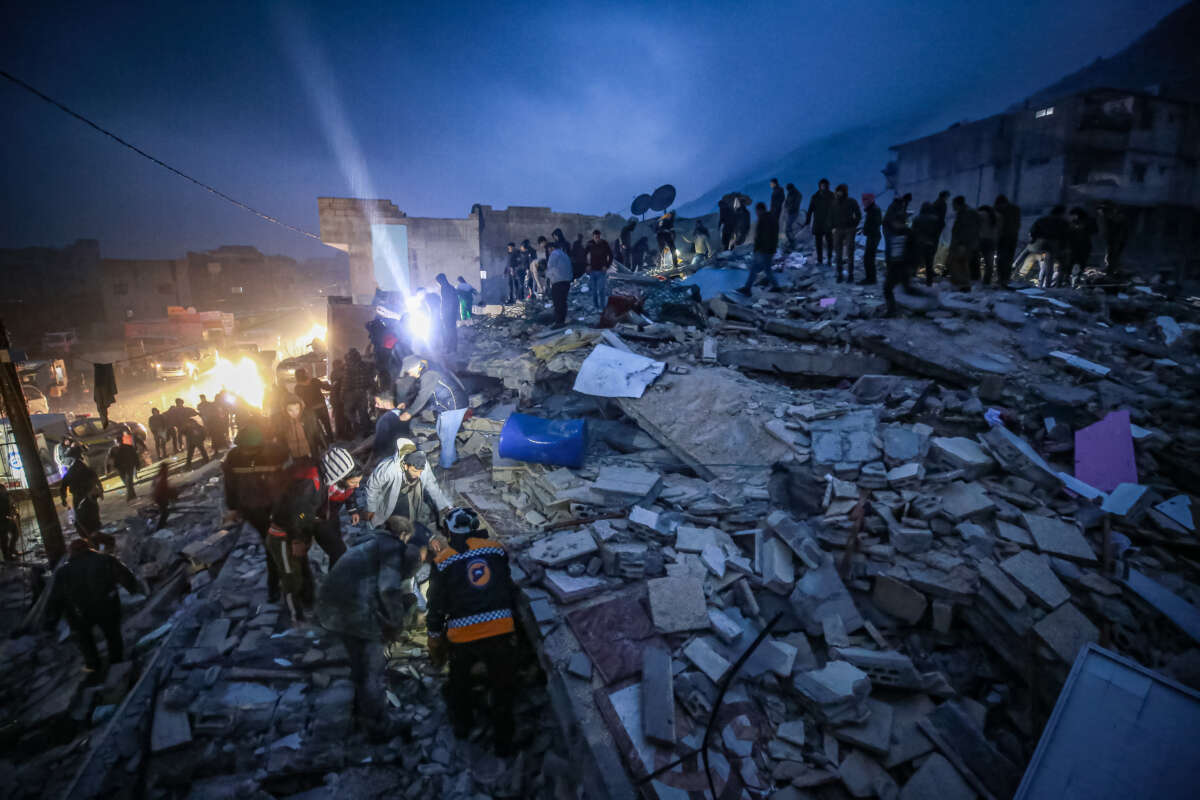Honest, paywall-free news is rare. Please support our boldly independent journalism with a donation of any size.
In the face of mounting pressure from rights groups and relief organizations on the ground, the Biden administration on Thursday issued a temporary license authorizing “all transactions related to earthquake relief that would be otherwise prohibited” by U.S. sanctions on Syria.
The move, announced by the Treasury Department on Thursday evening, amounts to a tacit admission that U.S. sanctions could have impacted the delivery of humanitarian aid to the country following the massive earthquake and dozens of aftershocks that killed more than 21,000 people in Syria and neighboring Turkey.
“As international allies and humanitarian partners mobilize to help those affected, I want to make very clear that U.S. sanctions in Syria will not stand in the way of lifesaving efforts for the Syrian people,” said Deputy Treasury Secretary Wally Adeyemo. “While U.S. sanctions programs already contain robust exemptions for humanitarian efforts, today Treasury is issuing a blanket General License to authorize earthquake relief efforts so that those providing assistance can focus on what’s needed most: saving lives and rebuilding.”
The sanctions relief, which will be in effect for 180 days, came after U.S. officials repeatedly denied that the restrictions would impact humanitarian aid. Earlier Thursday, U.S. State Department spokesperson Ned Price said during a press briefing that “there are many hurdles to overcome when providing humanitarian assistance in Syria and especially after devastating earthquakes this week, but our Syrian sanctions policy is not among them.”
But reporting and accounts from humanitarian leaders indicate that U.S. and European sanctions — which have long harmed Syrian civilians despite ostensibly being targeted at the Assad government—have hampered early aid and recovery efforts, compounding existing difficulties surrounding the delivery of emergency supplies to rebel-held areas of Syria. Freezing weather has also complicated aid and rescue operations.
Khaled Hboubati, the director of Syria’s Red Crescent, said earlier this week that “we need heavy equipment, ambulances, and firefighting vehicles to continue to rescue and remove the rubble, and this entails lifting sanctions on Syria as soon as possible.”
In a statement Tuesday, the Middle East Council of Churches called for “the immediate lifting of sanctions on Syria and allowing access to all materials, so sanctions may not turn into a crime against humanity.”
The Associated Press reported that “in theory, aid operations in government areas should not be blocked by sanctions, since both the U.S. and EU have exemptions for humanitarian aid.”
“But the reality on the ground is sometimes different,” the outlet noted. “Banks might block transfers to pay suppliers or local workers for aid organizations for fear of running afoul of sanctions, despite the exemptions. Also, U.S. sanctions and to some extent E.U. ones try to prevent rebuilding of damaged infrastructure and property in government-held areas in the absence of a political solution, which could hamper post-earthquake recovery.”
Abed Ayoub, director of the American-Arab Anti-Discrimination Committee, wrote on Twitter that “we welcome the decision by the U.S. Department of Treasury to issue a broad General License on Syria sanctions.”
“This will ease sanctions and allow for much-needed additional aid into the country,” Ayoub added.
Trump is silencing political dissent. We appeal for your support.
Progressive nonprofits are the latest target caught in Trump’s crosshairs. With the aim of eliminating political opposition, Trump and his sycophants are working to curb government funding, constrain private foundations, and even cut tax-exempt status from organizations he dislikes.
We’re concerned, because Truthout is not immune to such bad-faith attacks.
We can only resist Trump’s attacks by cultivating a strong base of support. The right-wing mediasphere is funded comfortably by billionaire owners and venture capitalist philanthropists. At Truthout, we have you.
Truthout has launched a fundraiser, and we must raise $31,000 in the next 4 days. Please take a meaningful action in the fight against authoritarianism: make a one-time or monthly donation to Truthout. If you have the means, please dig deep.
